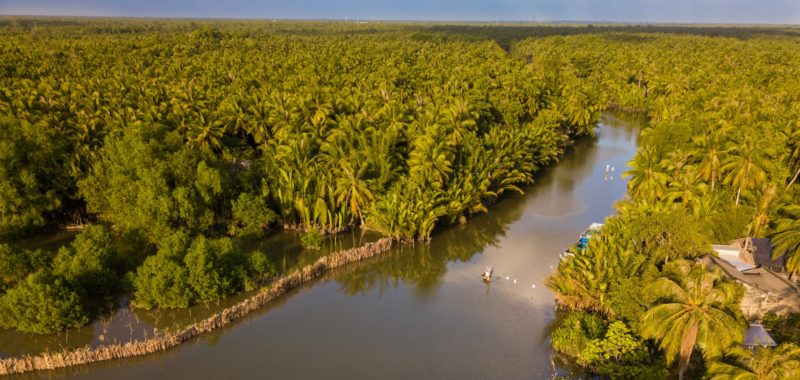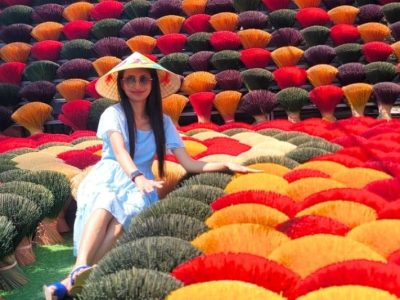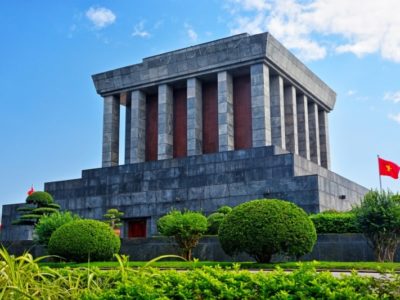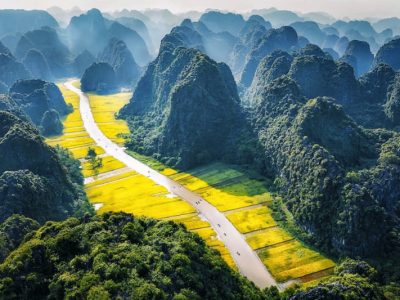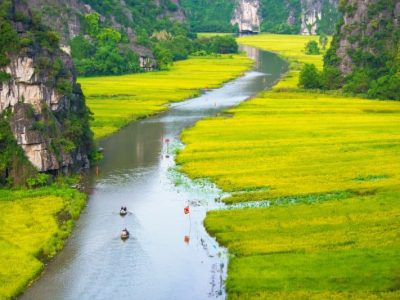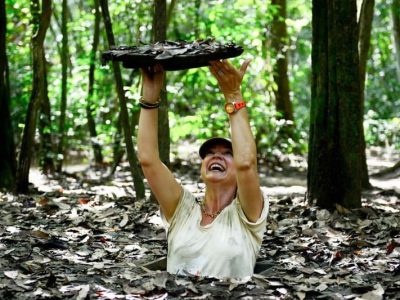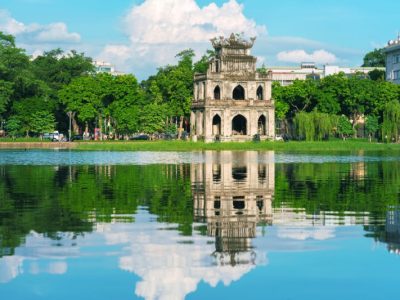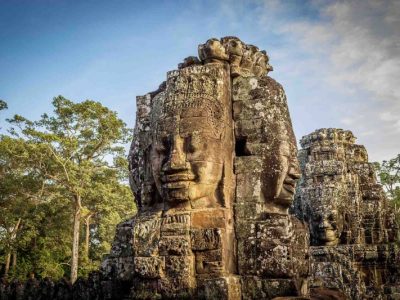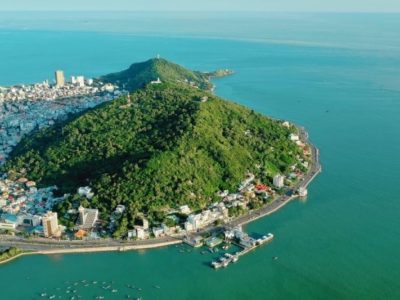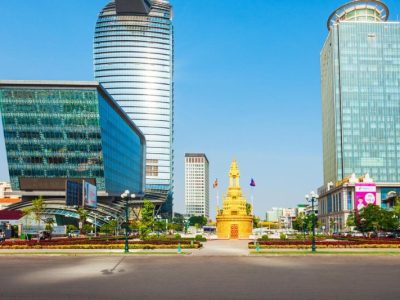Located in the Mekong Delta, Vinh Trang Pagoda is a famous religious site that Indian tourists can’t miss. With a rich history, the pagoda boasts a unique fusion of architecture from Eastern to Western.
Vinh Trang temple attracts thousands of visitors each day due to its peaceful space and exquisite Buddhist statues. In this article, we will dive into the history and specials of Vinh Trang Pagoda, as well as useful tips for Indian visitors.
Brief History of Vinh Trang Pagoda
Vinh Trang Pagoda was built in 1849 by Mr. Bui Cong Dat – a district chief in the Nguyen Dynasty. In 1894, Venerable Thich Hue Dang became the abbot of the pagoda and named the pagoda “Vinh Truong”, meaning “Eternal for mountains and rivers, eternal for heaven and earth”. People often call it the “Vinh Trang” pagoda.
After that, the pagoda underwent two renovations: one in 1907 by Venerable Tra Chanh Hau to repair the main hall, mixing Asian and European architectural features, and the remaining one was completely restored in 1930 by Venerable Minh Dang.
In 1984, Vinh Trang Pagoda was recognized by the Ministry of Culture, Sports and Tourism of Vietnam as a national historical and cultural relic. The Vietnam Record Book Center also set this place a record as “The first temple in Vietnam with architectural styles combining Eastern and Western” in 2007.
Over time, Vinh Trang Pagoda has grown larger and larger, making it a place for Buddhists and visitors to pray, go on pilgrimage, and find healing.
What Special About Vinh Trang Pagoda
With an area of about 20,000 m2, the pagoda involves a complex of Buddha statues, bell towers, main halls, and ancestral houses arranged extremely beautifully. When visiting Vinh Trang pagoda, our Indian travelers were impressed by the unique architecture and exquisite Buddha statues.
Unique Architecture (A Blend of The East and West)
The architecture of Vinh Trang Pagoda is a unique combination of Vietnamese, Chinese, French, Roman, and Khmer styles.
The Gate
In front of the pagoda, there is a special gate built in the form of an ancient structure. It was made by an artisan coming from the imperial city of Hue in 1933. The gate includes three parts: the entry of the gate, a small story that sets a Buddha statue, and the roof. The roof is exquisitely decorated with joining porcelain pieces that create dragons, unicorns, tortoises, phoenixes, fish, etc.. The materials are Vietnamese and Chinese porcelain with green glaze, creating iridescent colors.

The inside structure
The structure inside Vinh Trang Pagoda was built in the form of the Chinese letter “Quốc”, roofed with red tiles. The project has an area of 1,400 m2, including four consecutive spaces: the front hall, main hall, ancestral house, and back house.
The main side of the pagoda is built of concrete, overall resembling an old French-style house. Part of the pagoda’s roof is influenced by Khmer culture, and decorative ceramic tiles come from Japan.
The rows of columns on the facade and along the corridor towards the pagoda are slender, combined with arched windows. The arches are decorated with Roman architectural patterns mixed with the Western Renaissance style. The iron gates and windows resemble a French villa.
The inside of the main hall and the ancestral house are made in Chinese style but still retain Vietnamese architectural features. The rows of pillars inside are made of precious wood, and you can see the panels on the roof or the pillars with Chinese couplets.
In the main hall of the pagoda, there are over 60 Buddha statues cast in wood, bronze, terracotta, and cement. Many statues are gilded with shiny gold and were carved in the late 19th century. Connecting the areas is a square open space featuring greenery plants and a rockery in miniature. This rockery depicts mountains, pagodas, and towers, rich in Vietnamese identity.
Courtyard
Besides the exquisite interior architecture, Vinh Trang temple has manicured gardens with fruit-bearing trees, bonsai trees, flowers, and lotus ponds. Lots of Indian visitors like to stroll in this open space and enjoy the calm moments. Also, the courtyard stands out with three giant Buddha Statues.
Giant Statues
Vinh Trang pagoda is renowned for its giant statues which are exquisitely carved, exuding the peaceful, unworldly look of the Buddha.
Statue of Maitreya Buddha
On the temple grounds, you can easily find the Maitreya Buddha statue. The statue is 20 m high, 250 tons in weight, and is cast in reinforced concrete. The project was inaugurated in 2010.

Statue of Amitabha Buddha
Prominent in the middle of the garden is the 24m high Amitabha Buddha statue (pedestal 6m, statue 18m). The sculpture depicts the Buddha standing and watching over sentient beings in all realms. Many locals consider the Buddha statue to be the symbol of the Vinh Trang temple.
Reclining Buddha statue
Behind the main hall is a 32-m-long statue of Shakyamuni Buddha in the nirvana posture. The reclining Buddha statue captivates a large number of devotees and tourists to visit and pray.

7-Story Tower
In addition to the majestic Buddha statues, Vinh Trang Pagoda has a 7-story tower located at the rear. This tower is the place to keep the ashes of Buddhist disciples and monks of the pagoda.
Location
Vinh Trang Pagoda is located on Nguyen Trung Truc Street, My An Hamlet, Ward 8, My Tho City, Tien Giang Province, which belongs to the Mekong Delta in Southern Vietnam.
Opening Hours
Vinh Trang Pagoda is opened from 6: 30 AM to 7:30 PM daily
The Best Time to Visit
The best time to visit Vinh Trang Pagoda varies depending on your purposes. If you want to enjoy the tranquil atmosphere and admire the intricate architecture, the early morning is the suitable time. If you like the vibrant ambiance and explore religious events, the full moon days or pagoda festival days are the best time to visit Vinh Trang temple.
For Indian tourists who want to travel more to the nearby attractions, you should learn about the Mekong Delta weather to have a captivating outdoor trip. However, the best choice is still booking the private Mekong Delta tour package, which arranges the perfect schedule and adapts to your expectations.
How to Get Vinh Trang Pagoda
To approach the Mekong Delta and head to Vinh Trang Pagoda, Indian visitors can depart from Can Tho International Airport or Ho Chi Minh City.
Vinh Trang Pagoda is away from:
- Can Tho International Airport: about 115 km, over 2 hours to travel by car
- Ho Chi Minh City: about 75km, around 1 hour and 45 minutes to travel by car.
Useful Tips
- Dress modestly and politely
- Follow the guidelines in the pagoda.
- Remove your shoes before entering the main halls
- Walk softly, speak quietly, and avoid making loud noises inside the pagoda
- Respect sacred items.
- Make offerings respectfully.
- Learn and observe local customs.
- Maintain public hygiene
- Go with a local guide to learn in-depth about the historical and cultural values of the pagoda.
Conclusion
Vinh Trang Pagoda in Tien Giang province is a famous ancient temple and a unique architectural work in the Mekong Delta. Indian tourists will be impressed by the pagoda’s exquisite beauty and the peaceful atmosphere. Besides, ensure you take advantage of other exciting attractions in the Mekong Delta, such as the floating markets. Let’s contact us to make your trip more enjoyable!
OTHER ATTRACTIONS IN MEKONG DELTA
ITINERARIES WITH VINH TRANG PAGODA


